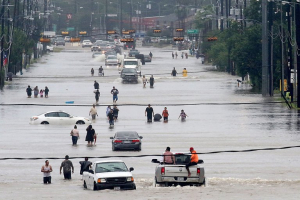Do you know how to be safe in a flood? As Hurricane Harvey continues to devastate Houston, killing least 10 people and injuring many more, it's crucial to know how to protect yourself, your family, and your home.
From the children's book "Chicken Little's Flood Advice" by Kathy Machado, here's a checklist to share with your children on how to stay safe in a flood.
-
Make a plan with my family so I know what I must do to be safe.
-
Plan and practice our escape and post the plan.
-
Pick two places we can meet, one outside on the street and one not far.
-
Put together some supplies. Band-aids, water, comfort food, batteries, clocks, scissors, tweezers, juice, soap, toys, and books. I'll go online and find a list.
-
Teach 9-1-1 to one and all; when and how to make the call.
-
Keep storm drains clean and gutters clear.
-
Volunteer to clean a creek.
-
Don't walk through floodwaters.
-
Don't drive through flooded streets.
-
Get out quick if our car stalls in rising waters.
For adults, here are some tips from the CDC on how to stay safe in a flood.
During a flood watch or warning:
- Gather emergency supplies.
- Listen to your local radio or television station for updates.
- Have immunization records handy (or know the year of your last tetanus shot).
- Store immunization records in a waterproof container.
- Fill bathtubs, sinks, gallon jars, and plastic soda bottles so that you will have a supply of clean water.
- Sanitize sinks/tubs first by cleaning them using a solution of one cup of bleach to five gallons of water. Then rinse and fill with clean water.
- Bring in outdoor possessions (lawn furniture, grills, trash cans) or tie them down securely.
- If evacuation appears necessary: turn off all utilities at the main power switch and close the main gas valve.
- Leave areas subject to flooding: low spots, canyons, washes, etc. (Remember: avoid driving through flooded areas and standing water.)
After you return home, if you find that your home was flooded, practice safe cleaning.
After flooding has occurred:
- Avoid driving through flooded areas and standing water. As little as six inches of water can cause you to lose control of your vehicle.
- Do not drink flood water, or use it to wash dishes, brush teeth, or wash/prepare food. Drink clean, safe water.
- If you evacuated: return to your home only after local authorities have said it is safe to do so.
- Listen to water advisory from local authorities to find out if your water is safe for drinking and bathing.
- During a water advisory, use only bottled, boiled, or treated water for drinking, cooking, etc.
- When in doubt, throw it out! Throw away any food and bottled water that comes/may have come into contact with flood water.
- Prevent carbon monoxide (CO) poisoning. Use generators at least 20 feet from any doors, windows, or vents. If you use a pressure washer, be sure to keep the engine outdoors and 20 feet from windows, doors, or vents as well.

















